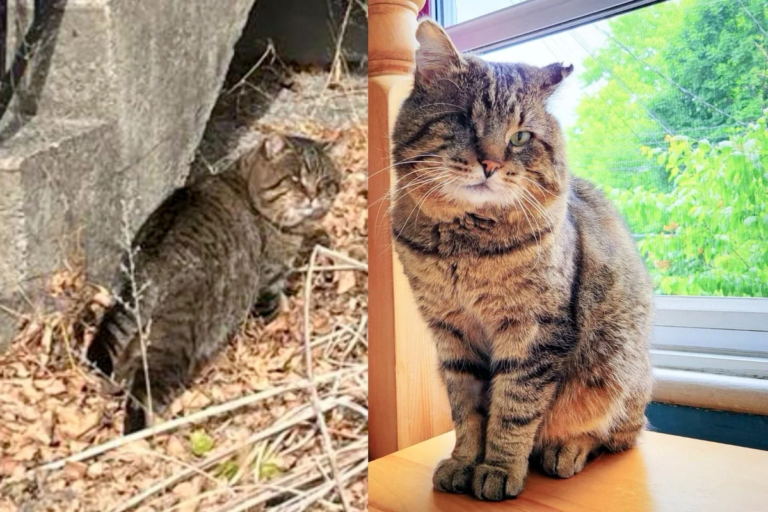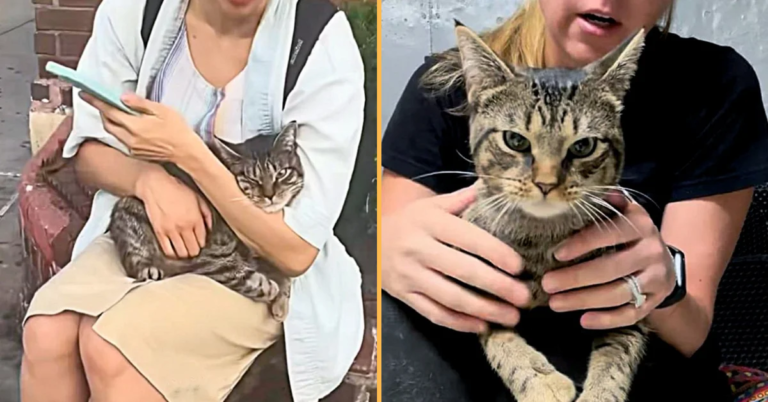Why Does My Cat Lick Me Then Bite Me?

If you’ve one or more cats, then you’ve probably been through this situation more than once where you find yourself asking ‘”Why does my cat lick me then bite me?”. That’s probably happened when your cat is sitting quietly on your lap, you are petting them and they’re licking you.
Then, all of a sudden, your cat bites you!
You have no idea what just happened. Didn’t they like the massage and petting you were giving them?
What is it that makes them engage in this conduct?
If your cat has a habit of this behavior and gives you her trademark ‘love bites’, the first thing you need to do is not take it personally. Your furry feline is as complex as other cats and all of them do this. I am yet to find a cat parent that has never been ‘lovingly’ bitten but we can’t help but think,” Why does my cat lick me and then bite me?”.
And thinking about it, I often wonder why does my cat bite me and then lick me; entirely the other way around, but very similar behavior! They really are bizarre animals sometimes.
If this is something that your kitties do then, in the video above and the rest of this article, we discover the broader meaning behind both the licking and biting behavior in our cats and find out the specifics behind why they might bite you after licking you.
No, Your Cat Doesn’t Hate You!
It is very easy to take your cat’s reckless licking followed by some cat biting to your heart. You might wonder where did you even falter. The majority of cat bites aren’t intense or dangerous and do not stem from anger against the pet parent. You should actually see them as cat love bites!
Yes, Your Kitty is Tired of Your Fussing and Affection
We, cat parents and enthusiasts, wear our love on our sleeves. And what’s the best way to show your affection? Of course, hugs, petting, kisses, and wholehearted cuddles. Well, this can backfire as cats have different moods just like humans. They enjoy attention up to a point and if your zealous demonstration of love runs amok, your furry feline will let you know, via a cat bite, that you are irritating him or her.
Taking a good look at your cat’s body language while you are petting her will give you an idea if she is up for some pampering or if you are about to get a dose of cat biting! Even cats have their personal space and you could be intruding it.
Your kitty giving you a soft cat bite is an indication from her that it is time you get away before someone gets hurt!
They are Still Kittens at Their Heart
A few years back we were frequently visited by a neighborhood cat, we lovingly nicknamed Barbie, who would run up to me and out of the blue nip my toe or finger. It doesn’t matter whether I am sitting or standing, she will find a way to award me with this random gesture.
Cat experts say these random gestures and gentle cat bites are evocative of their years as kittens when they would playfully interact with each other. Honestly, knowing this fills my heart. It is almost like our cats consider us to be their pack members.
My cat, Barbie, would even plop down and expose her belly. A nice gentle belly rub was more than enough for her. If your cat does this after gently biting you, she is letting you know she adores you enough to let you touch her furry belly.
Cat bites resulting from their playful nature are rarely going to hurt you. They are just mild nibbles by your cat asking you to pay more attention. The only right way to respond is through a gentle stroke.
If your cat’s playful kitten behavior is a bit too mouthy, you can exercise caution.
First of all, you need to stop using your hands as bait while playing. Your ‘adult’ kitten might not know the extent of her scratching or cat biting. So replace your hand with a toy. Use it to attract your cat to play. Wands and string are great options.
You can clicker train your cat. Contrary to popular belief, cats are independent yet trainable. You will just need a bucket full of patience and a clicker. It even helps them destress and feel secure.
This has been my dream and if you get to achieve it, give me a big shout-out. I know it might be hard to believe but there are cat parents out there who have been able to successfully train their cats to play fetch. They claim that it is one of the most rewarding experiences they have with their kitty but most of us will have to take their word for it!
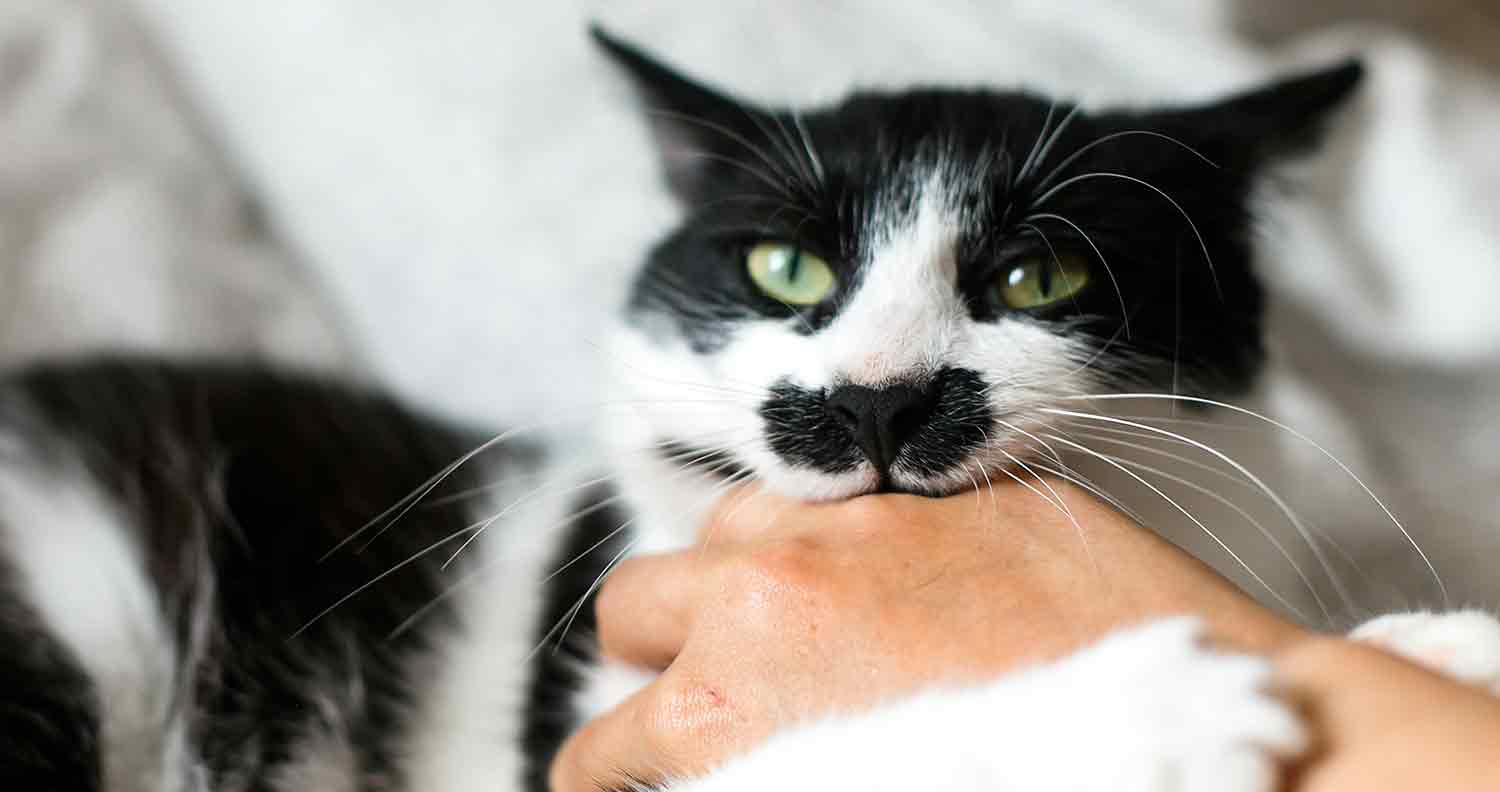
Cat Bites, Rough Play and Aggression
Cats are by nature predatory. In the wild, while growing up they learn the art of successful hunting through mock stalking, pouncing, and biting. They play real rough and this is the natural way they grow up.
Cats raised as pets may not need to hunt but they still have the same instincts. Their rough play is a part of social bonding and preparing for adulthood. And if your fur baby didn’t have feline playmates, guess who she will be trying her well-aimed cat bites out on? Y-O-U!
There are high chances your kitty will find a playmate in you and try rough play. Playful aggression and real aggression can be differentiated if you pay close attention to your cat’s body language. If she is not hissing at you, she is playing. You will know if you are going to get a proper cat bite, that’s for sure!
However, there is one thing you need to remember. In the wild, cats mix up their prey and play drives. We all have seen videos of how sometimes cats play with their food. And historically, these plays would have ended with a kill, for food.
So, be careful when you encourage playful aggression of your kitten. Right now she is tiny and cute. But as an adult, a cat bite during rough play can cause infection and swelling.
You can use positive reinforcement techniques to correct playful aggression. First of all, do not scold her for cat love bites and aggression during playtime. This will confuse her and she might associate your scoldings with playtime and end up getting withdrawn from you.
Even though it feels negative, this is a social behavior, so tackle it wisely. The moment she bites you, stop paying her attention. Do not caress her. Over time, your furry feline will learn to associate her cat bites with the end-of-play sessions.
The only key here is to be consistent with your behavior. If your cat bites, she misses fun time.
Next, you need to reinforce her positive behavior. When she is playing respectfully, playing without cat biting, or just licking you and purring, encourage the behavior by telling her she is a “good kitty” and then proceed to give her a piece of her favorite treat.
She needs to associate her pleasant behavior with treats. And over time you will have a trained kitty. Tough to achieve but certainly worth it!
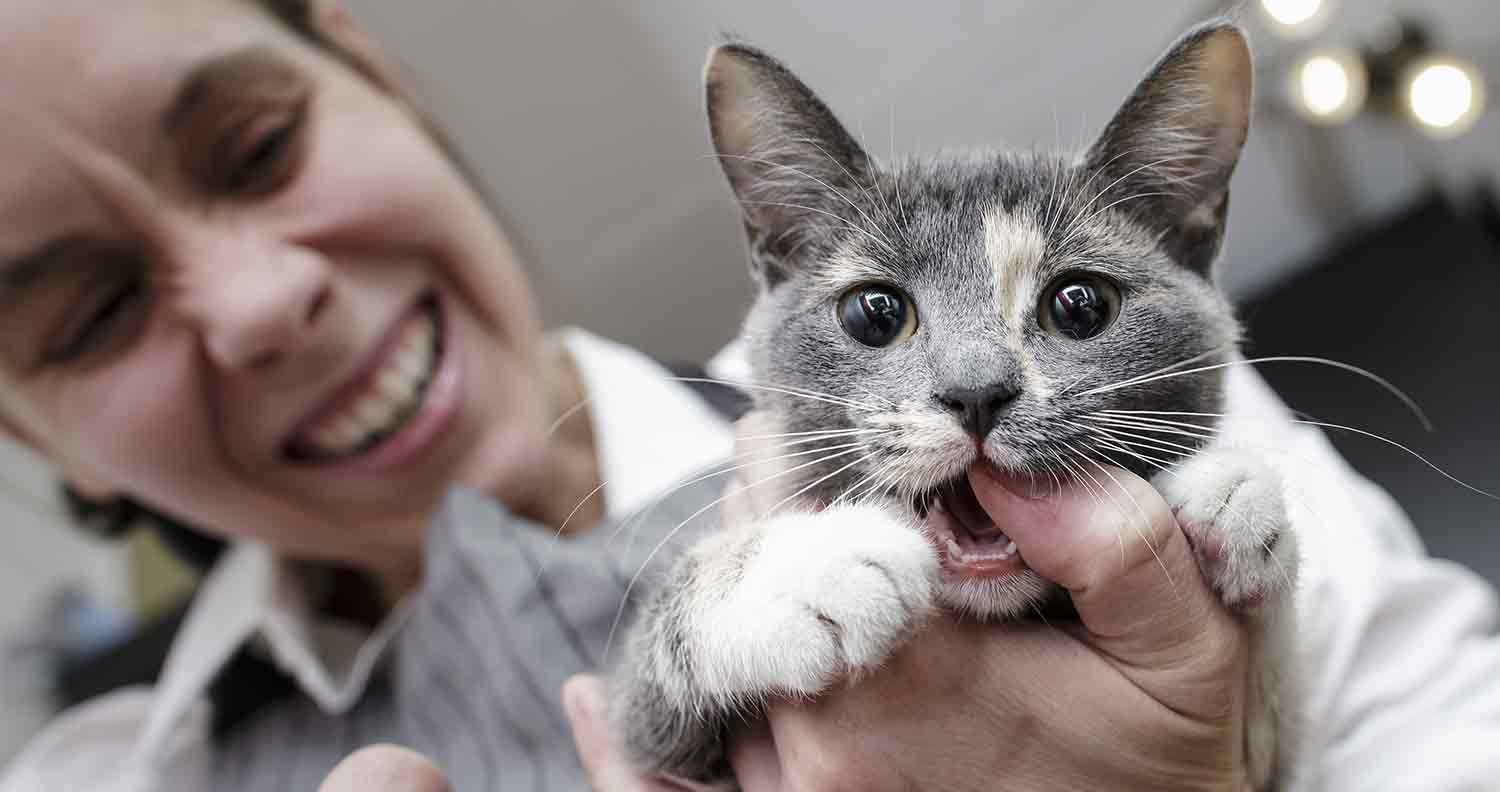
Overstimulation and Over Petting Could Be The Reason Your Kitten is Biting
So, your cat came up to you for attention, you petted her and after a while, she bit you? There were times I legit thought my cat was an A-list jerk until I knew better.
When you pet or handle your cat in areas that are overly sensitive to her or continue to pet her for too long, she might return the favor by giving you a gentle cat bite.
Areas like the base of her back and tail are very sensitive. You might feel that you are just gently stroking while she would be unable to handle it. This results in a cat bite from them to tell you to stop.
Similarly, over petting can cause your cat’s hair follicle receptors to hurt. You might be giving your kitty a gentle back rub and the feeling of mutual admiration would be in the air. Then she jots like a bolt and bites you. Well, you overstimulated her by petting and there are ways to know if you crossed a line.
Cats have personalities and their liking for petting sessions varies. Some will love to knead your leg as you stroke their back and rub their ears, while a few of them will hiss at you the moment you reach out to cuddle.
To Avoid Getting Your Cat Overstimulated:
- Keep the petting sessions short. Pet her in the areas she is comfortable. And her tail is out of limits! Seriously, never try to pet, pull, stretch, or knead her tail. That’s blasphemy in the feline world.
- Look closely at your cat’s body language to check if she is really enjoying your touch. Some cats hide their discomfort until you have pressed their nuclear activation code.
- Give her breaks. If you know your furry feline is able to handle petting for only three minutes, stop after one and a half minutes. Give her a treat.
- Pay attention. Cats are subtle communicators. When they love, they don’t go gaga all over licking your face. Similarly, when they are annoyed they won’t engage in death glares. Signs of discomfort could be freezing, flattened ears, twitching of their skin on the back, flicking of the tail, low intensity growls, or even sudden head turns to watch the movement of your hands.
- Signs of discomfort could be freezing, flattened ears, twitching of their skin on the back, flicking of the tail, low intensity growls, or even sudden head turns to watch the movement of your hands.
- Discontinue at the first sign of aggression. You might be okay with the level of aggression your cat is displaying. But your kitty might be finding it very stressful and your cat biting may be a likely result
- Wait for your cat to settle down if you overstimulated her. It can take her a few minutes or several hours to be comfortable around you. Do not attempt to pet her again immediately. I promise you will regret it.
- Tough love will worsen the aggression. Yelling at your overstimulated cat or punishing her for kitten biting will only increase her aggression. Hitting your cat is the worst idea EVER! The only right way is to be respectful of her space, handle her properly, and learn more about play techniques.
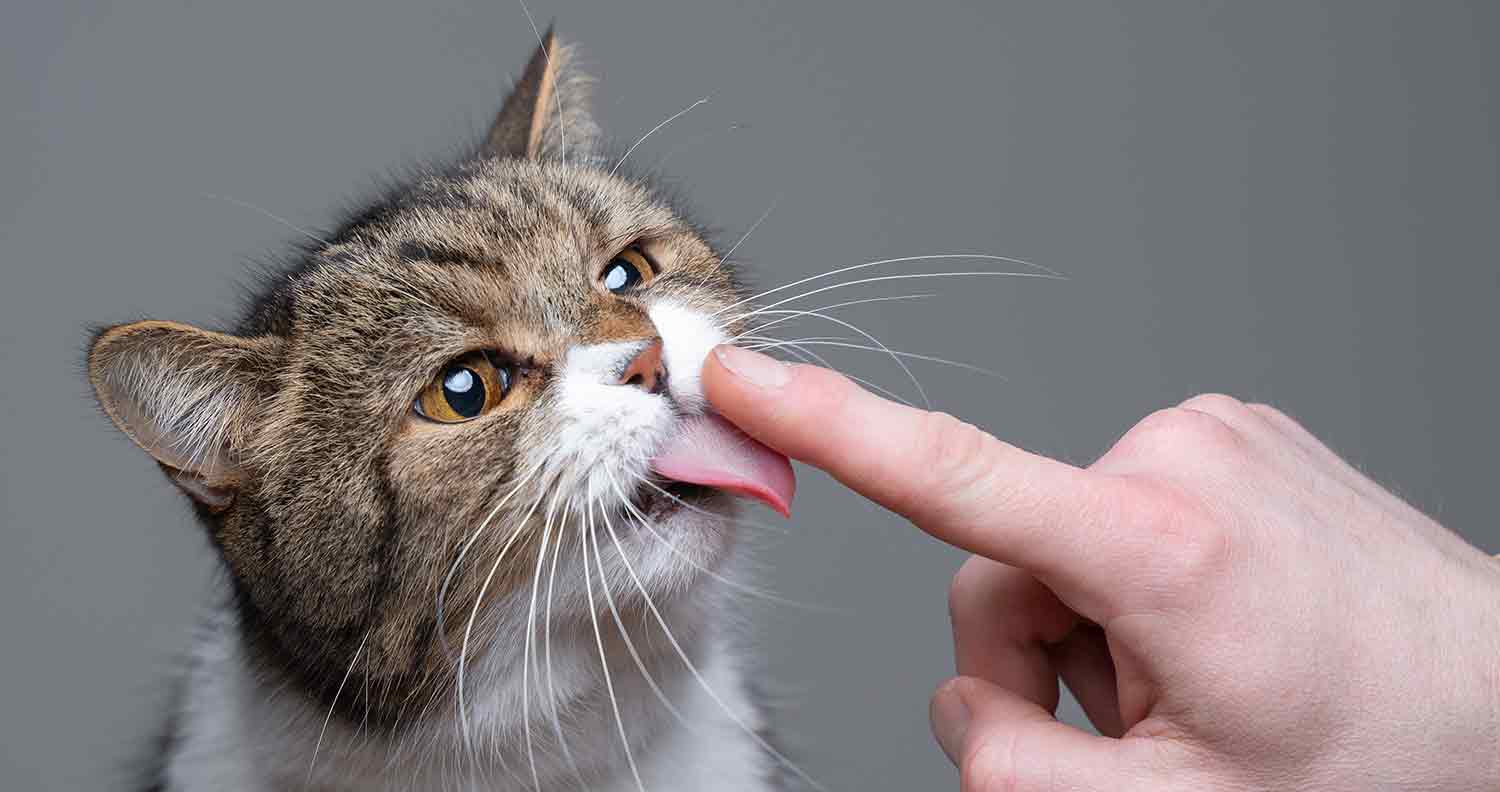
How You Differentiate Between Cat Love Bites and Serious Aggression
To understand how to differentiate between cat love bites and serious aggression, we will need to dive into a detailed discussion about their licking and biting.
Cat licks
Cats are fond of licking. This is a positive behaviour unless your fur baby is giving in to compulsive constant licking. In fact, compulsive licking is one of the most common signs of stress and anxiety in cats.
If she is licking one particular spot, she might be experiencing pain or discomfort there due to skin infections, rashes, or injury. Take a close look to detect if there’s any foreign object causing her distress. Book an appointment with the vet if the compulsive licking doesn’t stop.
Normally, cats lick themselves clean to remove dirt caught in their fur coat and to unravel their hair. This behaviour is also projected onto their playmates as a goodwill gesture.
If your cat licks your hair, be prepared to meow and purr a bit because your cat considers you her feline company. She is exhibiting her love towards you by grooming you.
Is it a Cat Love Bite or Should I be More Wary?
Depending upon the severity of the bite, you can range it as a gentle cat love bite to show affection to a serious puncturing wound.
Unless you have been extremely negligent towards the signs your cat is displaying, it is very rare to get seriously harmful cat bites from your kitty. She will show tons of glaring warning signs before proceeding to hurt you.
If your cat is truly terrified, she will show it explicitly in the form of signs like curved back, hissing, growls, raised hair, waning meows and potential cat bites are in the post!
Angry cat bites and painful scratches are rare and altogether different from playful licking and biting. Both playful cat love bites as a form of affection and warning cat bites to tell you to stop fussing over them are gentle and never meant to hurt you.
So, Why Does My Cat Lick Me Before Biting Me, then?
Licking and cat biting are individual behaviours but your cat might decide to combine them as per her whims and wishes.
And almost every time- it is a positive behavior. That’s just your kitty saying “I wuvvv you” in cat language.
She might proceed to cat bite you after licking to tell you the petting session for the day is over. Wind up fast. She loves you but she needs her own breathing space
Gentle cat biting can also be an invitation for you to start a over a session of grooming. Their gentle nibbling is a part of their grooming process. Sit down for the beauty session and watch them fuss all over you as they knead your leg, lick your head, and gently nibble your hands.
If your cat is displaying signs of unprovoked aggression, get her thoroughly checked at the vet office. There might be serious underlying causes behind this behaviour.



